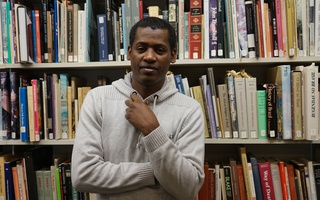Harvard's W.E.B. DuBois Institute for Afro-American Research yesterday named 23 scholars as resident fellows for this academic year, according to a statement from the Institute.
The Institute provides its fellows with the opportunity to do research using Harvard's resources and facilities. In return, Harvard enjoys the diversity and knowledge of its scholars, the statement said.
Among this year's fellows is philosopher Wande Abimbola, the former Majority Leader in the Senate of the Federal Republic of Nigeria and Vice Chancellor of Obafemi Awolowo University in Ile-Ife.
He will spend his fellowship this year at Harvard completing research focusing on the "Oral Literature in Africa."
According to Fellows Officer Richard A. Newman, the DuBois Institute was established in 1975 and aims to provide its fellows with a chance to do research they might not have been able to do.
"Some [of our Fellows] come from universities where they have a heavy teaching schedule and therefore can't research and write," Newman said. "And some live in places where there are not strong libraries and facilities.
"Harvard is a nurturing and encouraging community," Newman said. "So it is a privilege for us to provide the necessary facilities, support Over the past years, 250 leading scholars in African-American Studies have passed through the DuBois Institute. "I am delighted we are able to advance this dynamic new field of inquiry by providing a base for their research and writing," said Henry Louis Gates, Jr., Professor of Humanities at Harvard and Director of the Institute. Guthrie Ramsey, a fellow researching contemporary black music, said he is anxious to work with other scholars in the same area. "Many people hardly ever get a chance to be in a collectivity where everyone is working on an aspect of the same thing," Ramsey said. In addition to allowing fellows to discuss their research with other leading scholars in the field, the Institute provides them with a forum to present their findings. Colloquia, hour-long presentations of research topics, have been scheduled for Wednesdays from noon to 2 p.m. at the Department of Afro-American Studies. Harold Weaver, who will be working on a project called "Paul Robeson Revisited," said the program's colloquia attracted him to the fellowship. "For the past year and a half I have been here for the colloquia," Weaver said. "[I was impressed by] the quality of scholars that are brought in to work. The international community of scholars from Asia and Africa...provided for a very exciting intellectual environment." Other fellows include professors Alliot Benedicte from the Sorbonne, Katharine Balfour of Princeton University, Stephen Behrendt of the University of Northern Iowa, Daphne Brooks from UCLA and Tung-Jung Chen from the National Central University of Taiwan. Maria Diedrich from the University of Munster, Richard Dozier of Florida A&M, Brent Edwards of Rutgers, David Eltis of Queens University, E. Nathaniel Gates from the Cardozo School of Law, John Gennari of the University of Colorado and Cheryl Greenberg of Trinity College will also join the Institute of fellows. Rounding out the 23 are Sieglinde Lemke of the Freie Universitat, Berlin, Anita Patterson from the University of Illinois, Carl Pedersen from Odense University, James Smethurst from Harvard, Barbara L. Solow '45, an independent scholar, H. Lewis suggs from Clemson University, Michael West from the College of the Holy Cross and Lecturer in History and Literature Edward L. Widmer '84 of Harvard University. The fellowships for Abimbola and Eltis are funded by the Ford Foundation. According to the institute, the Ford Foundation is continuing its effort to strengthen Harvard's Afro-American Studies department by funding these two senior African scholars
Read more in News
Overseers Expect Few ChangesRecommended Articles
-
Kudos to ScholarsW e were recently honored to welcome sociologist William Julius Wilson to the Kennedy School of Government, and we are
-
Bunting Institute Announces Fellows for '96-'97The Bunting Institute of Radcliffe College has invited 37 scholars--poets, mathematicians, econo-mists and composers--to participate in the 35th year of
-
A Center for EnergyEconomists, political scientists, public policy experts, architects and designers, lawyers, and scientists—all of these members of the Harvard community study
-
 Art Scholar Bequeaths Villa to Harvard
Art Scholar Bequeaths Villa to Harvard -
 A Safe Haven for Scholars at Risk
A Safe Haven for Scholars at Risk













